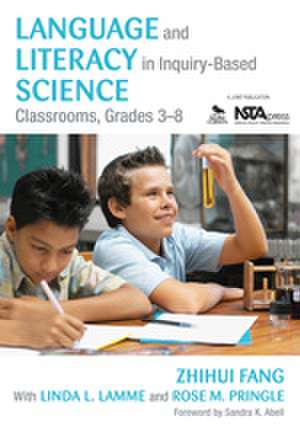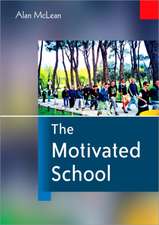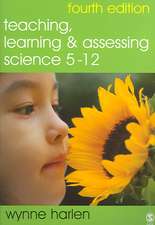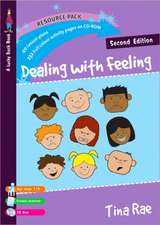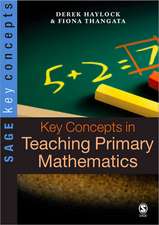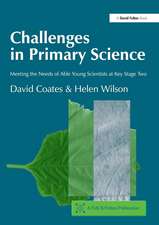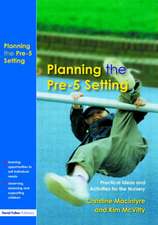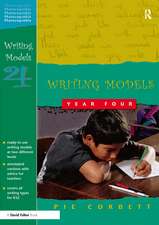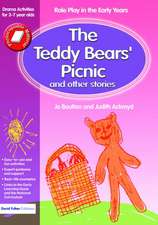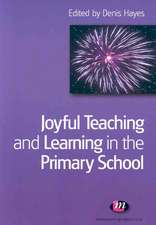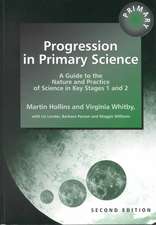Language and Literacy in Inquiry-Based Science Classrooms, Grades 3-8
Autor Zhihui Fang, Linda L. Lamme, Rose M. Pringleen Limba Engleză Paperback – 2 noi 2010
- Read and comprehend science texts
- Find related resources to explore particular interests
- Build their science vocabulary
- Write to learn science concepts.
This volume is valuable for teachers, leaders of professional development workshops, institutes, topical seminars in science and literacy, science and reading methods courses and study groups.
Preț: 247.30 lei
Nou
47.32€ • 48.82$ • 39.49£
Carte tipărită la comandă
Livrare economică 27 martie-10 aprilie
Specificații
ISBN-10: 141298842X
Pagini: 168
Dimensiuni: 178 x 254 x 13 mm
Greutate: 0.36 kg
Ediția:1
Editura: SAGE Publications
Colecția Corwin
Locul publicării:Thousand Oaks, United States
Recenzii
"This book addresses an issue that is like an elephant in the room. Everyone knows that reading is an issue in science, but ultimately no one is teaching students to read science."
"Finally, a book that not only provides sound research, but also offers practical, ready-to-use reading and vocabulary strategies to connect reading and science!"
"Reading and writing can no longer be optional extras in the science classroom. This work shows how the demands of reading scientific texts differ from those of reading literary texts, clarifies the features of scientific text that must be learned so that it's readable, and describes the tools teachers need to teach reading in science."
"This must-read book sets the standard for teaching reading comprehension with expository text! I have already implemented some of the activities mentioned with great success."
"This book embeds literacy tasks into science inquiry to enhance the functionality of instruction, support the construction of understanding, and develop a fundamental sense of science literacy. This results in fuller participation in the public debate about issues of science, technology, society and environment, which in turn leads to informed decisions and sustainable actions."
"My first thoughts were, 'I’m not one of those teachers who teaches science by reading out of the book.' Sneaking the strategies in Language and Literacy in the Inquiry Based Science Classrooms, Grades 3-8 convinced me that students could learn science and improve their literacy skills without taking away from my curriculum. The methods and ideas in this book are useful, non-threatening and helped me apply language practices that enhance science."
Cuprins
Acknowledgments
About the Authors
About the Co-Authors
1. Teaching Science as Inquiry
Inquiry-Based Science
Language and Literacy in Inquiry-Based Science
Overview of This Book
2. The Challenges of Science Reading
What Does It Take to Comprehend a Text?
Linguistic Challenges of Science Reading
Conclusion
3. Using Trade Books to Support Science Inquiry
Why Read Trade Books in Science?
Award-Winning Science Trade Books
Becoming Familiar With the Format of Science Trade Books
Using Trade Books to Empower Science Learning
Conclusion
4. Learning Language, Learning Science
Building a Language-Rich Science Curriculum
Developing Vocabulary Knowledge
Learning About Nouns
Disentangling Discourse
Conclusion
5. Scaffolding Reading Through Strategy Instruction
Reading Strategy Instruction and Text Comprehension
Reading Strategy Instruction in Action: A Vignette
Bootstrapping Comprehension: Activating and Integrating Prior Knowledge
Monitoring Comprehension: Promoting Thinking During Reading
Consolidating Comprehension: Organizing Information From Text
Principles and Practice of Reading Strategy Instruction in Science
Conclusion
6. Learning to Write and Writing to Learn in Science
Why Write in Science?
Learning to Write Scientifically
Writing to Learn in Science: An Instructional Framework
Implementing the Writing-to-Learn-Science Instructional Model
Classroom Activities That Promote Writing to Learn Science
Conclusion
Endnotes
References
Index
Notă biografică
Zhihui Fang (Ph.D., Purdue University) is Professor of Language and Literacy Education in the School of Teaching and Learning at the University of Florida, where he also coordinates the Reading Education program. He specializes in content area reading and writing, language development, and teacher education. His recent research focuses on the role of language in construing disciplinary knowledge and in shaping students¿ literacy development. He is particularly interested in exploring the use of evidence-based language and literacy practices to support science teaching and learning. Zhihui has authored over 70 publications that include books, book chapters, and journal articles. His Reading in Secondary Content Areas: A Language-Based Pedagogy (University of Michigan Press, 2008), co-authored with Mary Schleppegrell, describes a new approach to teaching reading in the subjects of science, mathematics, social studies, and language arts. He can be contacted at zfang@coe.ufl.edu.
